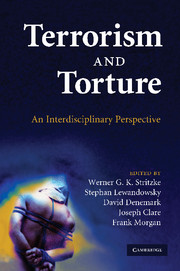Book contents
- Frontmatter
- Contents
- List of figures
- List of tables
- List of contributors
- Preface
- 1 The terrorism–torture link: when evil begets evil
- 2 Torture, terrorism, and the moral prohibition on killing non-combatants
- 3 The equivalent logic of torture and terrorism: the legal regulation of moral monstrosity
- 4 War versus criminal justice in response to terrorism: the losing logic of torture
- 5 Reducing the opportunities for terrorism: applying the principles of situational crime prevention
- 6 From the terrorists' point of view: toward a better understanding of the staircase to terrorism
- 7 If they're not crazy, then what? The implications of social psychological approaches to terrorism for conflict management
- 8 The cycle of righteous destruction: a Terror Management Theory perspective on terrorist and counter-terrorist violence
- 9 Misinformation and the “War on Terror”: when memory turns fiction into fact
- 10 Icons of fear: terrorism, torture, and the media
- 11 What explains torture coverage during war-time? A search for realistic answers
- 12 Reversed negatives: how the news media respond to “our” atrocities
- 13 Terrorism and TV news coverage of the 2001 Australian election
- 14 Terrorism, anxiety, and war
- 15 I'm right, you're dead: speculations about the roots of fanaticism
- 16 Reducing terrorist risk: integrating jurisdictional and opportunity approaches
- Index
Preface
Published online by Cambridge University Press: 15 September 2009
- Frontmatter
- Contents
- List of figures
- List of tables
- List of contributors
- Preface
- 1 The terrorism–torture link: when evil begets evil
- 2 Torture, terrorism, and the moral prohibition on killing non-combatants
- 3 The equivalent logic of torture and terrorism: the legal regulation of moral monstrosity
- 4 War versus criminal justice in response to terrorism: the losing logic of torture
- 5 Reducing the opportunities for terrorism: applying the principles of situational crime prevention
- 6 From the terrorists' point of view: toward a better understanding of the staircase to terrorism
- 7 If they're not crazy, then what? The implications of social psychological approaches to terrorism for conflict management
- 8 The cycle of righteous destruction: a Terror Management Theory perspective on terrorist and counter-terrorist violence
- 9 Misinformation and the “War on Terror”: when memory turns fiction into fact
- 10 Icons of fear: terrorism, torture, and the media
- 11 What explains torture coverage during war-time? A search for realistic answers
- 12 Reversed negatives: how the news media respond to “our” atrocities
- 13 Terrorism and TV news coverage of the 2001 Australian election
- 14 Terrorism, anxiety, and war
- 15 I'm right, you're dead: speculations about the roots of fanaticism
- 16 Reducing terrorist risk: integrating jurisdictional and opportunity approaches
- Index
Summary
A famous quote attributed to F. M. Dostoevsky notes that “while nothing is easier than to denounce the evil-doer, nothing is more difficult than to understand him.” Terrorism and torture are twin evils that have dominated news headlines in the years following the 9/11 terrorist attacks in 2001. As the former ambassador from Pakistan to the United Nations, Ahmad Kamal, observed, the lines between good and evil become blurred when “terrorists” are often defined on the basis of their success or failure; those who succeed become heroes and even heads of state, whereas those who fail are labeled as terrorists (Kamal, 2002). Likewise, while torture is universally denounced by civilized nations as the dark side of evil, working on that “dark side” was considered “vital” by US Vice President Dick Cheney in responding to terrorist threat (Cheney, 2001). Understanding the architects of terror and torture goes beyond the simple differentiation of “you are either with us or against us” (Bush, 2001), and beyond vilification of those (e.g., multiple Grammy award winners The Dixie Chicks) who dare to cast a self-critical eye on the tensions between our own moral principles and amoral actions. Understanding the evil-doer is difficult, not the least because it also involves looking in the mirror and asking who one is, what one does, and how one is perceived by others. Terrorist acts and torture are not simply “evil”; they have knowable causes. This volume aims to illuminate the terrorism–torture link from multiple, interdisciplinary perspectives.
- Type
- Chapter
- Information
- Terrorism and TortureAn Interdisciplinary Perspective, pp. xiii - xivPublisher: Cambridge University PressPrint publication year: 2009

